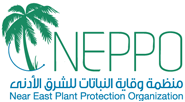The Near East Plant Protection Organization (NEPPO) supported by Imperial College London “through the Beyond Compliance Global (BCG) project”, has organized a virtual regional meeting on 8th of December 2020, in order to build the capacity of the countries of North Africa and the Near East along with its continuing threat of that are still in our fields and orchards. This session was titled “Xylella fastidiosa… the old and new challenge”.
Xylella fastidiosa (Xf) causes significant damage to many plants of agricultural and environmental value. The spread of Xf in Southern Europe poses a strong threat to the “biosecurity of the North Africa and the Near East (NANE) region”. To face this high potential threat, many NANE countries have implemented severe phytosanitary measures and have even banned the importation of plant material from all infested countries, and yet that lead to hindering the trade.
NEPPO has also developed a regional Pest Risk Assessment (PRA) which concluded by a high probability of entry, dissemination of the bacteria because of the presence of host plants, vector and similar climate. Accordingly the social, economic and environmental impacts have been rating the level of “very high”.
The purpose of this meeting was to discuss the regional PRA and the phytosanitary measures those being implemented to deal with Xf and to initiate a new approach in the analysis and yet to put the clear definition of risk mitigation measures under ISPM 14. That being logically related to systems approach (SA).
It is important to highlight that; the meeting should be organized with Tunisian NPPO and their potential stakeholders to help them in developing production chain and Decision Support for Systems Approach (DSSA). It was suggested to organize this meeting to involve and yet to share most of the regional countries as Xylella fastidiosa represents the big concern for NANE countries.
The meeting was aimed to:
- promote the interest of region to be involved in Beyond Compliance Global project,
- enhance the awareness’ of the NPPOs countries of NENA toward the advantages of implementing (BCG) in stimulating and facilitating the export of their crops, and yet in improving their own production chains,
- improve the regional PRA of Xf that might be amended and improved by the thoughts and comments different trends of the participants,
- improve the grape production chain by the experience and feedback of the participants,
- improve the (DSSA) by sharing the experience of the participants.
From 32 registered participants, 29 participants attended to the meeting those were representing 8 countries, FAO (RNE, SubRNE), and ICL.
During that meeting, the updated regional PRA was presented and comments were looked for its enhancement by most recent information that related to legislation, contingency (emergency) plans, surveillance plans those being developed and implemented within the region.
- the updated regional Pest Risk Assessment;
- the production chain of grapes planting material with suggestions of measures to be implemented to mitigate risk of introduction of Xf (Tunisia case)
- and the decision support for systems approach (DSSA) related to the above production chain.
Questioner have been formerly developed for such reasons and its’ results showed that;
– 73 % developed a contingency plan to face XF,
– 82% trained their staff;
– 82% implemented a surveillance plan; and
– 64% developed a communication plan.
Nevertheless, some of the participants highlighted the presence of Xf on ornamental palm (Phoenix reclinata) of which isolating attempts of Xf being hardly to be conduct.
As Tunisia submitted such a request of support from the Global Beyond Compliance to implement phytosanitary measures which sound scientifically justified, ensuring an appropriate level of protection for Tunisian to prevent the entry of Xf. No direct (face-to-face) meetings have been possibly to be organized among the intention parties and the relevant stakeholders because of COVID 19.
The goal of these meetings was to help Tunisian NPPO to develop a production chain for the importation of grape planting materials and the Decision Support Systems (DSS). The production chain of certified planting materials will allow to identify the weaknesses points to be addressed by relevant measures. These measures should be examined and approved by stakeholders. based on Tunisian NPPO prepared production chain they will develop a Decision Support Systems.



